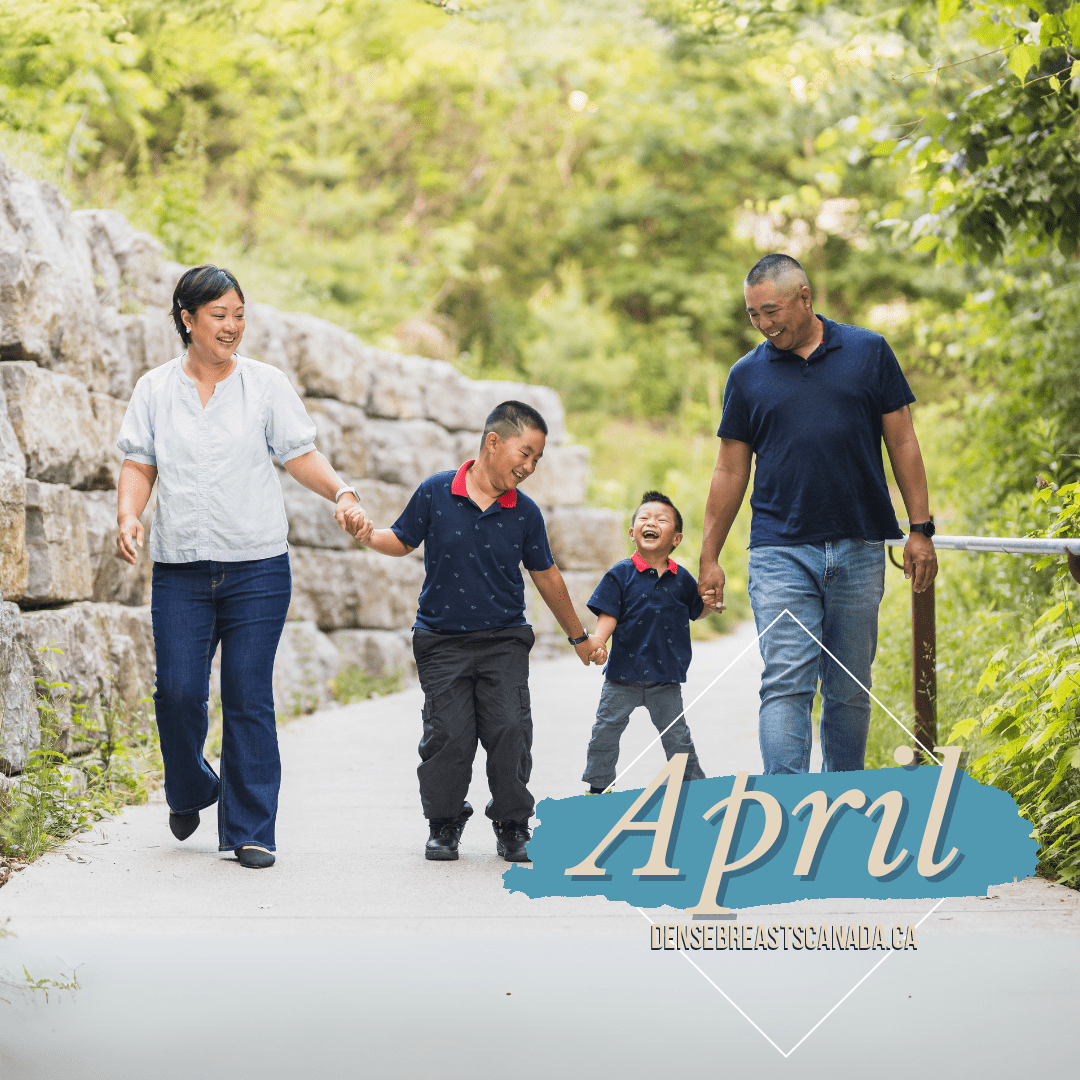April

Genetic testing and a high-risk breast screening program saved my life. A reminder that what you don’t know can absolutely hurt you.
It all started when my mom was diagnosed with ovarian cancer at the end of 2019, almost 15 years after battling and defeating breast cancer. Because of this and a history of breast cancer on my maternal side, she was encouraged to undergo genetic testing. It was determined that she had the BRCA2 gene mutation, and I was recommended to get tested too. With my own subsequent BRCA2 diagnosis?meaning my risk of developing breast cancer in my lifetime was around 40-85%?it was a no-brainer for me to enroll into a high-risk breast screening program, which ensured regular and frequent breast screening despite being under the age of 40.
In the fall of 2022, after an amazing year of mat leave with my youngest, I went in for that routine screening, and they found something. Invasive ductal carcinoma was confirmed through further imaging and biopsies. I remember going to meet the pathologist to get my biopsy results and her saying. ?Oh, you’re here alone!?, which is a real ?tell me I have cancer without telling me I have cancer? kind of moment (for the record, despite her well intentions, I was absolutely fine to handle the news on my own).
The weeks and months that followed were a whirlwind, with numerous appointments for imaging, consultations, a bilateral mastectomy, 8 rounds of dose-dense chemotherapy (AC [aka the red devil]-taxol), and 15 rounds of radiation. Sprinkled in between were appointments to check on the drains (and eventually remove them) after my mastectomy, weekly visits to clean my PICC (peripherally inserted central catheter) line that was my access point for chemo, and all the other countless touch points with my care giving team. Because I was young (38 when first diagnosed), they threw everything at me to make sure they got rid of the cancer and that it would have a hard time coming back.
There were tough moments, but I think I did well, working full-time through it all and staying involved as a mother of two young children. As a chronic over-thinker, I was surprisingly unfazed by the scary side of cancer; I was just ready to do what needed to be done. What took the biggest toll was the seemingly little things, like losing my breasts and my hair, two aspects that previously defined my physical femininity. A lot of it was emotional rather than physical.
It’s been almost 2 and a half years now, and while I’m still undergoing preventative treatments, I feel like I’m mostly on the other side. But my life has undeniably changed forever. And I?m determined more than ever to turn my experience into something positive, even if it?s small. So I continue to share my story as much as I can in hopes that it resonates with others.
I?ll end this story with 3 things I’ve learned on my cancer journey:
1. Genetic testing and cancer screening saves lives: For me, genetic testing and the high-risk breast screening program did what it was intended for. I had no other symptoms, so had I not been screened, who knows how long it would have been until the cancer was discovered. Maybe it would have been too late.
2. The BRCA2 gene is known as the breast cancer gene, but BRCA2 mutations are linked to other types of cancer: In addition to breast cancer, those with the BRCA2 gene mutation are at higher risk for ovarian, pancreatic, prostate, and stomach cancer, as well as melanoma. I never knew this, and it explains a lot of the family history of cancer. A few months ago, I underwent a risk-reducing salpingo-oophorectomy (the removal of both of my ovaries and Fallopian tubes) after being on the wait list for over a year. At almost the exact same time, my mom found out that her ovarian cancer had returned for a second time. I can’t help but think that if she had been given the same preventative surgery that I have now undergone, maybe the two run-ins with ovarian cancer could have been avoided.
3. Knowledge is power: This sounds cliché, but everything I have learned through my experience and from those I’ve met on my cancer journey has completely opened my eyes, both to the wonderful advancements in cancer care and the surprising gaps that still exist. Sharing that knowledge?and in some cases, advocating for change?is imperative to progress.
So consider this story as my baby step towards that progress. Hopefully what I’ve shared will help someone out there who is going through something similar. Each cancer journey is unique, but there is so much to gain from connecting with others, and if my story can help even one person, it?s worth it.
